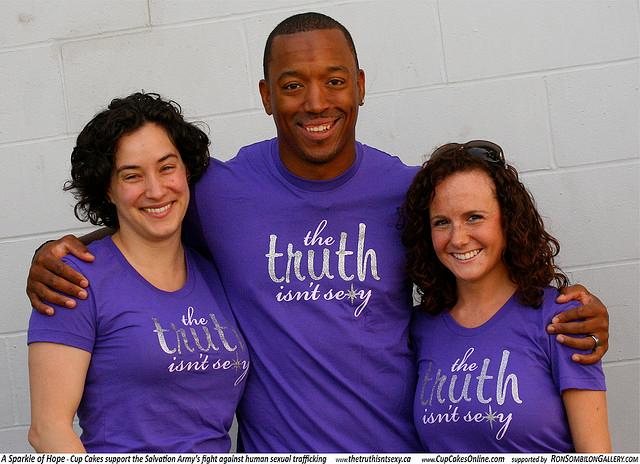Protecting children from sex trafficking continues to be elusive goal
Volunteers pose in support of The Salvation Army’s campaign to end human trafficking. (Photo from Flickr user Rob Sombilon.)
Recently, the Washington legislature enacted a law requiring websites advertising escort services, like backpage.com, to obtain documentation that escorts advertising on their sites are at least 18.
The industry is already required to disclose the age of its employees, but Nicholas Kristof, a columnist for The New York Times, said the age disclosures are not always truthful.
“And, indeed, on backpage that girl, or any girl, will be listed as 18 or 19, and some of the girls who have been trafficked in the past who told me that 18 is really code for 15 or 16 and 19 means 17 or 18,” Kristoff said. “Now, backpage says it is now more rigorous about that, and it is trying to eliminate some of the words that used to be code for underage girls, like ‘fresh 18-year old,’ things like that, but there is no doubt that a lot of girls are underage and are marketed on backpage, even though they are under 18.”
However, Kristof said that backpage is not driving underage sex trafficking, rather demand is. He said addressing the problem may require reducing demand.
“There are some initiatives around the country to crack down on johns, and I think that is promising,” Kristof said. “But at the end of the day, when that demand looks for finding a girl, it goes to backpage more than anywhere else. About 70 percent of the market is on backpage.com — 70 percent of the online prostitution market is on backpage, and there is, I think, some evidence that if one were to take out that channel that there would indeed be less trafficking. There would be less prostitution and, with it, less of this underage prostitution.”
Often those paying for sex are not arrested. In a discussion over whether to criminalize paying for sex in Britain, some argued that arresting johns would be “unworkable.” Kristof described the online market as asymmetrical between escorts and johns. Those paying for sex are able to almost always remain anonymous while escorts are advertised online.
“I just came across a case in Michigan where a 16-year old went missing. Her family was desperate to try to find her. They found an ad for her on backpage, and so they contacted law enforcement, and it (the ad) had a phone number. Law enforcement, the police then made a raid, and they found this 16-year old girl, and they arrested her,” Kristof said. “You know, here she is. She’s 16-year old girl. She’s a victim of trafficking, and she gets arrested and the johns don’t.”
Kristof said he couldn’t think of another situation in which the victims are arrested and the perpetrators, the pimps and johns, largely are not.
But critics of Kristof argue without backpage, a black market would emerge or other websites would crop up, and those would invariably be less cooperative with law enforcement. Kristof disagrees with that notion.
“Backpage, to its credit, it responds very quickly to subpoenas. It does, to some degree, try to screen ads that show very young girls. I wouldn’t say it tries as hard as it should, but it does try,” Kristof said. “I just don’t buy that argument. You know, backpage told me, for example, that in Seattle they had been able to identify two girls that had been trafficked, and because of their tips, law enforcement rescued them. On the other hand, I came across 23 girls who had been underage, who had been rescued separately, independently by authorities, all of whom had been marketed on backpage, so I just think that it is a major forum for this kind of trafficking.
“There’s some evidence, for example, that when Craigslist went out of the escort ad business that business did drop, and I find that promising.”
Kristof said he used to be in favor of complete legalization of prostitution among consenting adults but now believes it does not work. In the Netherlands, where prostitution is legal and regulated, human trafficking in on the rise.
